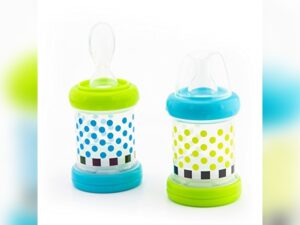Table of Contents Show
Nutrition plays a vital role in the growth and development of every individual, especially in the delicate early years of life.

For infants, in particular, proper nutrition is crucial as it sets the foundation for their overall health and well-being in the long run.
Baby nutrition encompasses a range of factors, including breastfeeding, the introduction of solid foods, and the consumption of nutrient-rich foods that support optimal growth.
As infants rapidly grow and develop, providing them with the right balance of nutrients is essential for their physical, cognitive, and immune system development.
Introducing solid foods
As your baby grows, the time will come to introduce solid foods into their diet. This exciting milestone not only marks a new stage in their development but also highlights the importance of baby nutrition.
Providing the right nutrients during this crucial period sets the foundation for their future health and well-being.
Your baby’s first step toward eating solids is an exciting one! Here are some tips to make the process smooth and enjoyable:
- Timing: Most pediatricians recommend starting solids around 6 months of age, when your baby is able to sit up and show signs of readiness. However, every baby is different, so consult with your pediatrician for the best time to start.
- Start with purees: Begin with single-ingredient, smooth purees like mashed bananas, avocado, or sweet potatoes before moving on to mixed or textured foods. This helps your baby get used to the new taste and texture gradually.
- Offer a variety of foods: Introduce a wide range of fruits, vegetables, grains, and proteins to expose your baby to different flavors and nutrients. Start with one new food at a time, waiting a few days before introducing another, to watch for any potential allergies or reactions.
- Consistency: Initially, purees should be very smooth and runny to prevent choking. As your baby progresses, you can slowly increase the thickness and texture of the foods to encourage chewing and swallowing.
- Feeding utensils: Use a small, soft-tipped spoon to feed your baby. Avoid putting food in bottles as it can lead to overeating and interfere with the development of proper chewing and swallowing skills.
- Breastfeed or formula-feed before offering solids: Ensure your baby is not hungry or overly tired when introducing solids.Up until about age one, breast milk or infant formula should remain be the child’s main source of nutrition.
Nutritional requirements for babies
Nutritional requirements for babies are crucial for their growth and development.Here are some important things to think about:
Breast milk or formula
Breast milk or formula should be the main source of nutrition for babies up to 6 months old.
It provides all the necessary nutrients, including proteins, fats, carbohydrates, vitamins, and minerals, to support their rapid growth.
Fruit and vegetable
Offer a variety of fruits and vegetables to provide vitamins, minerals, and fiber.
Fresh or cooked, pureed or mashed, all options are suitable. Aim for different colors to ensure a range of nutrients.
Grains and carbohydrates
Include foods like rice, oats, quinoa, and whole-grain bread or cereals to provide carbohydrates for energy. These can be introduced as mashed or pureed options initially.
Proteins
Apart from breast milk or formula, include sources of protein such as pureed meats (chicken, beef, or fish), legumes, and tofu. Ensure the proteins are properly cooked and soft for safe consumption.
Healthy fats
Incorporate healthy fats from sources like avocados, nut butters, and pureed or mashed cooked vegetables, especially those containing oils (such as olives or coconuts) to support brain development.
Iron-rich foods
Iron is crucial for a baby’s healthy development. Offer iron-rich foods, such as pureed meats, fortified cereals, and cooked beans or lentils.
Pairing these with foods high in vitamin C (like fruit) aids in iron absorption.
Cow’s milk and dairy products
Cow’s milk is not recommended as the main drink for babies under one year old.
It can be introduced in small quantities after one year, and full-fat dairy products (plain yogurt, cheese) can be included from 6-8 months of age.
Breastfeeding vs. formula feeding
Ensuring optimal baby nutrition, whether through breastfeeding or formula feeding, contributes to a healthy start in life.
The choice between breastfeeding and formula feeding plays a significant role in meeting their nutritional needs.
Let’s explore the importance of baby nutrition in the context of breastfeeding and formula feeding:
- Nutritional composition: Breast milk is considered the ideal source of nutrition for babies. It contains a perfect balance of proteins, fats, carbohydrates, vitamins, minerals, and antibodies, providing optimal growth and protection against infections. Formula milk is designed to mimic breast milk and provides adequate nutrition, but it lacks some of the unique components found in breast milk.
- Convenience: Breastfeeding eliminates the need for preparing bottles, measuring formula, and sterilizing equipment. It is readily available and at the right temperature. However, it requires the mother to be available for feeding and can sometimes be challenging, especially for working mothers. Formula feeding offers more flexibility and allows others to participate in feeding.
- Cost: Breast milk is free, while formula feeding can be costly, as it involves the purchase of formula, bottles, and other feeding equipment. Additionally, breastfed babies generally require fewer doctor visits and have a lower risk of certain health conditions, potentially leading to cost savings in the long run.
- Bonding: Breastfeeding creates a unique bond between the mother and baby. The skin-to-skin contact and close proximity provide emotional comfort to the baby while promoting bonding and attachment between mother and child. However, formula feeding can also provide bonding opportunities through eye contact, touch, and cuddling.
- Maternal health benefits: Breastfeeding has various health benefits for mothers, including a reduced risk of breast and ovarian cancers, improved postpartum weight loss, and decreased risk of type 2 diabetes. It also releases hormones that promote bonding and uterine contraction, aiding in postpartum recovery and healing.
Impact of Nutrition on the immune system
A strong immune system is supported by proper nutrition. Here are some key ways in which nutrition impacts the immune system:
- Macronutrients: Consuming a balanced diet that includes an adequate intake of macronutrients like carbohydrates, proteins, and fats is essential for a properly functioning immune system. Protein is particularly important as it helps build and repair immune cells.
- Vitamins and minerals: Various vitamins and minerals play vital roles in supporting immune function. For example, vitamin C helps stimulate the production of immune cells and enhances their function. Vitamin D is important for immune regulation, while zinc supports the development and function of immune cells.
- Antioxidants: Antioxidants, such as vitamin E, vitamin C, and beta-carotene, help protect the immune cells from damage caused by harmful free radicals. They neutralize these free radicals and reduce oxidative stress, which can otherwise impair immune function.
- Fiber: A diet rich in fiber from fruits, vegetables, whole grains, and legumes helps support a healthy gut microbiota. The gut microbiota plays a critical role in immune function, as it helps regulate immune responses and defends against harmful pathogens.
- Omega-3 fatty acids: These healthy fats found in fatty fish, flaxseeds, and chia seeds have anti-inflammatory properties that can help modulate immune responses. They also support the production of compounds that regulate immune function.
Importance of early nutrition on long-term health
Early nutrition plays a crucial role in long-term health for several reasons:
Development and growth
Proper nutrition in the early years is essential for the overall growth and development of a child.
It provides the necessary nutrients, vitamins, and minerals required for the development of the brain, bones, muscles, and other organs.
Immune system development
Early nutrition plays a significant role in strengthening the immune system. Proper nutrition helps in building antibodies, reducing the risk of infections, and preventing chronic diseases in later life.
Cognitive development
Adequate nutrition during early childhood supports optimal brain development.
Nutrients like omega-3 fatty acids, iron, and vitamins contribute to improved cognitive function, memory, attention, and learning abilities.
Prevention of chronic diseases
Proper nutrition in the early years can help prevent the onset of chronic diseases such as obesity, diabetes, heart disease, and hypertension later in life.
A balanced diet rich in fruits, vegetables, whole grains, and lean proteins can reduce the risk of these conditions.
Establishing healthy eating habits
The eating habits and food preferences developed in early childhood tend to persist into adulthood.
Introducing a variety of nutritious foods at a young age can help inculcate healthy eating habits that will positively impact long-term health.
Bone health
Adequate nutrition, particularly calcium and vitamin D intake, during childhood and adolescence, is crucial for the development and maintenance of strong bones.
This can help prevent conditions like osteoporosis and fractures in later life.
Mental health
Early nutrition can also influence mental health outcomes. Consuming a balanced diet with adequate nutrients such as omega-3 fatty acids, zinc, and B vitamins can support good mental health, reduce the risk of depression, and improve overall well-being.
Practical tips for optimal baby nutrition
When it comes to ensuring optimal nutrition for your baby, here are some practical tips to keep in mind:
- Breastfeeding: If possible, exclusive breastfeeding for the first six months is recommended. Breast milk provides all the necessary nutrients and antibodies to strengthen the baby’s immune system.
- Avoid early introduction of solid foods: It is generally recommended to start introducing solid foods around six months of age, as this is when babies can sit up and have better control of their heads and neck. Starting too early can put unnecessary stress on their digestive system.
- Introduce a variety of foods: Once you start introducing solid foods, offer a wide variety of fruits, vegetables, whole grains, lean proteins, and dairy products (if tolerated). This helps expose the baby to different flavors, textures, and nutrients. Gradually introduce one new food at a time to identify any potential allergies or intolerances.
- Soft and mashed consistency: Initially, puree or mash the food to a consistency that is appropriate for your baby’s developmental stage. As they grow and develop better chewing skills, you can gradually increase the texture of the food.
- Offer finger foods: As your baby becomes more skilled at eating, introduce soft finger foods. This helps with fine motor development and encourages self-feeding, promoting independence and developing good eating habits.
- Limit processed and sugary foods: Avoid giving processed foods, sugary snacks, and drinks high in sugar or artificial additives to your baby. Instead, focus on providing whole, natural, and nutrient-dense foods.
Conclusion
The importance of baby nutrition should not be underestimated. Proper nourishment and a balanced diet are essential for the healthy growth and development of infants.
The early stages of life are crucial for laying the foundation of a strong immune system, cognitive abilities, and physical well-being.
By providing adequate and age-appropriate nutrition, such as breast milk or formula, and introducing nutritious solid foods, we can ensure that babies receive the necessary nutrients that support their rapid growth.
Additionally, the importance of baby nutrition extends beyond infancy, as it sets the stage for lifelong habits and reduces the risk of chronic diseases later in life.
Parents and caregivers must prioritize the nutritional needs of babies, as it directly impacts their short-term and long-term health outcomes.
Cathy Ryan
The creative force behind Baby Nurturers - is a passionate advocate for all things baby. With years of experience in the parenting industry, Cathy is dedicated to providing valuable insights, tips, and resources to support parents in nurturing and caring for their little ones.










